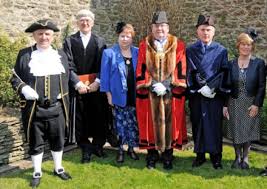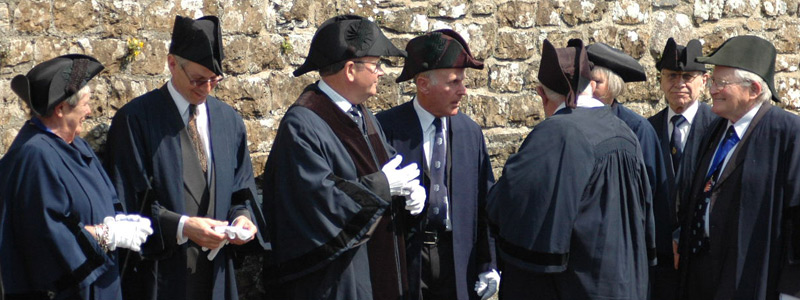Easter Monday saw Winchelsea’s former corporation perform its traditional mayoring ceremony in the historic Court Hall. Passers-by will have seen a small group, some in 19th-century civic costume and chains of office, gathering outside in the High Street after the ceremony.
Winchelsea’s ceremony is often taken to be the equivalent of Rye’s mayor-making, which takes place in May. However, Rye’s mayor is an elected councillor, who is chosen by other elected councillors, whereas Winchelsea’s mayor is “elected” by and from among a group of between 13 and 18 Freemen, almost a third of whom are not residents. The other 600 residents of Winchelsea have no say in the matter.
The former corporation says that the mayoring continues a 700-year tradition and celebrates Winchelsea’s history as an ancient town and Cinque Port. This year’s event was attended, as usual, by other (elected) Cinque Port mayors and by Keith Glazier, leader of East Sussex County Council, and Ian Jenkins, chairman of Rother District Council.

Opinions about the mayoring differ among the unenfranchised residents of Winchelsea. Some share the sense of history claimed by the former corporation. Others are barely aware of the event and a few don’t even know that there is a mayor and corporation in Winchelsea.
However, some residents take a more critical view. They see the present ceremony as celebrating the town’s disreputable past as a Rotten Borough. During this period, from the 15th to the 19th century, elections for Winchelsea’s mayor were restricted to no more than 13 so-called Freemen. On occasion, there were as few as nine. The Freemen also had the right to elect two MPs. As they were generally employed by the government as Customs officers and heavily bribed (the amount of money laid out at elections in Winchelsea upset Daniel Defoe, among others), they naturally voted for candidates nominated by the government of the day.
Winchelsea lost its two MPs under the Reform Act of 1832. The corporation lost its remaining civic and judicial powers in 1886, being replaced by a parish council shared with the neighbouring village of Icklesham (in Rye, the corporation transmuted into the town council). However, rather than being abolished, Winchelsea’s former corporation was preserved as a charity in order to maintain the membership of the Cinque Port Confederation. That is now its only role. Critics ask the question: why is time and money being spent in the 21st century on the veneration of a historic political injustice?
A number of the mayoring’s critics also see the ceremony as divisive, since very few residents are invited. Indeed, the same charge is levelled at the former corporation itself, which is accused of acting like a masonic lodge and interfering in the affairs of the town. In the memoirs of a former parish council chairman, the former corporation was even accused of trying to bribe him to oppose the building of council houses after the last war. More recently, upset was caused by a boycott of the town’s Diamond Jubilee celebrations in 2012 by the then mayor.
The mayor this year is the same as last year, Stephen Turner.
The author lives in Winchelsea



